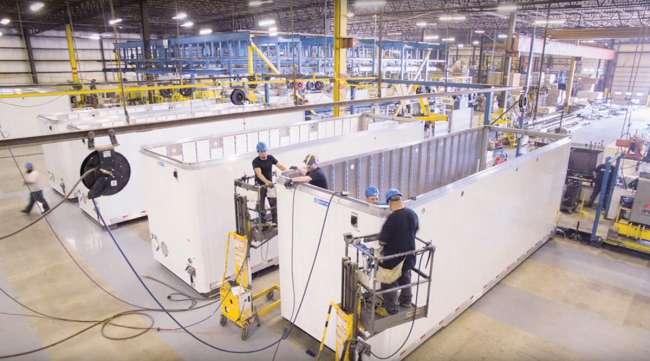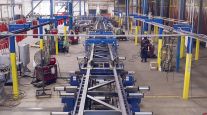Senior Reporter
March Net Trailer Orders Dip Below 7,600, ACT Research Says

[Stay on top of transportation news: Get TTNews in your inbox.]
Net U.S. trailer orders slipped below 7,600 in March as cancellations sliced the gross tally nearly in half, and production slowed, ACT Research reported.
Orders were 7,595 and gross orders were 13,279, or 43% higher before cancellations, according to ACT. Net orders were 15,783 a year earlier.
“I think there’s good reason to be very concerned in the short to medium terms. The unemployment numbers [26 million as of April 23] are certainly something that rattle everybody, and will continue to. We haven’t seen most of this hit yet, it’s sad to say,” Frank Maly, ACT’s director of commercial vehicle transportation analysis, told Transport Topics.

Maly
He said expect significant double-digit declines in GDP in the second quarter.
“When you shut down an entire economy,” Maly said, “it is hard to bring things back in any sense of an orderly fashion.”
FTR’s Don Ake, vice president of commercial vehicles, sees similarities in equipment demand with the Great Recession, which lasted from December 2007 to June 2009.

Ake
“We have the industry’s second-quarter production being what is was at the low point of the Great Recession,” he said, adding FTR expects production will gradually improve later this year and into next year.
In related news, Wabash National Corp. announced plans to implement a two-week idling of operations and companywide furlough from April 20 to May 3. The Lafayette, Ind.-based trailer maker reported customer support functions will continue to operate during the furlough.
“We are moving rapidly to adjust to the current environment while prioritizing the safety of our employees and ensuring the liquidity and financial well-being of the company. We are taking the difficult, but necessary, decisions at all levels of the company to contain cost and preserve the strength of our balance sheet,” CEO Brent Yeagy said in a statement.
Great Dane has slowed down production at its plants as it continues to build trailers, and its full-service branches and dealers continue to provide parts, service and equipment, a company executive said.

Hammond
“We’ve been working closely with customers to be sure we have the production available to match their timing,” said Chris Hammond, executive vice president of sales. “But when the states begin to open up and folks go to work, that will certainly create more confidence in all of the fleets that need trailers and lead to increased purchasing.”
Craig Bennett, Utility Manufacturing Co.’s senior vice president of sales, said the company was working through the backlog while “not replacing it near the level three months ago.”
Utility had reduced its workforce to respond to slowing demand heading into 2020, and now is reducing it further, he said.
“We are hanging on still in all plants, barely in some. Closing a plant is always an option,” Bennett said. “This thing is bad and getting worse short-term.”

Giesen
Stoughton has no plans to shut down plants and has orders that will keep employees working through the summer, said David Giesen, vice president of sales for Stoughton. “And this can buy us some time for the economic rebound that we all want to see.”
He added, “New orders are very slow, but there is a pulse at our larger fleet customers as they look at current and future demand.”
In the meantime, Milestone Equipment Holdings, a transportation equipment lessor, is ordering and taking delivery of new dry vans in a measured approach to keep its fleet fresh, a company executive said.
It typically places orders directly with three trailer manufacturers and has the flexibility with its contracts to change the timing or quantities throughout the year, “which is no different than any year prior,” said Chuck Cannata, Milestone’s highway division general manager.

Much of the trucking industry relies on older onboard technology for critical functions, which can hurt reliability and efficiency. So is it time for fleets and their technology vendors to implement faster replacement cycles for onboard tech? Seth Clevenger talks to Ray Greer of Omnitracs and Deryk Powell of Velociti. Hear a snippet, above, and get the full program by going to RoadSigns.TTNews.com.
St. Charles, Mo.-based Milestone has more than 60,000 trailers in its fleet and more than 30,000 pieces of related equipment such as chassis and containers.
One large fleet is choosing to invest more in trailers compared with trucks this year.
“While we are investing less capital in physical assets, namely power equipment, we continue to invest in our trailing fleet,” Brad Delco, vice president of finance for J.B. Hunt Transport Services Inc., said during the company’s first-quarter earnings call. The company has about 33,500 trailers.
J.B. Hunt Transport Services Inc. ranks No. 4 on the Transport Topics Top 100 list of the largest for-hire carriers in North America.
Knight-Swift Transportation Holdings Inc. reported it would continue to prioritize replacing its trailers, among other uses for its reduced capital expenditures in 2020. The company has about 69,500 trailers.
Knight-Swift ranks No. 5 on the for-hire TT100.




